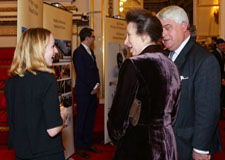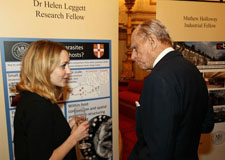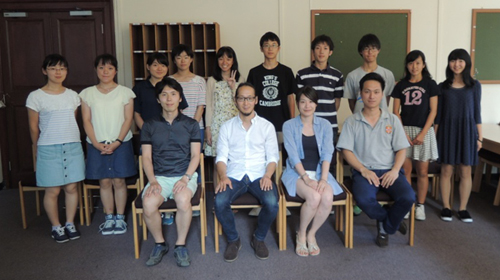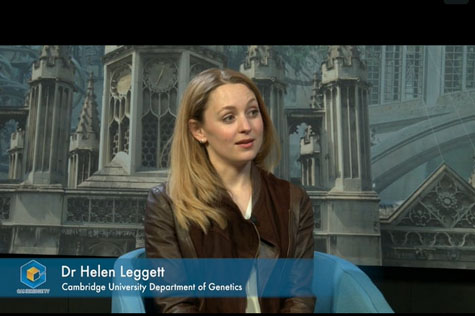Members of the Department, especially at Postgraduate level, sometimes participate in outreach activities. Some recent examples include:
Why do parasites harm their hosts? Dec 2016
Helen Leggett is a Fellow sponsored by The Royal Commission for the Exhibition of 1851. This is a charity that was set up after the Crystal Palace burned down, with HRH Princess Anne the current President. Helen presented her research on behalf of the Research Fellows at Buckingham Palace on 1 Dec 2016. She chatted with both Princess Anne and with Prince Philip [the previous President].
 |
 |
Bacteria talk at Frettenham Primary School
As part the University's Teaching Associates Programme (TAP), Helen Leggett visited a local primary school to teach 8-10year olds a bit about good and bad bacteria as part of their topic session on micro-organisms. The children set up experiments with bread to test which conditions encouraged mould and bacteria to grow: 2x2 fully factorial experiment + controls, dry/wet sandwich bags, on top of radiator vs room temp. The children also looked at some of our model study species- drosophila and c.elegans.
The School’s verdict : A bit disgusting but very interesting!
Link to school website: http://www.harnserfed.co.uk/blog/2017/02/dr-leggett-bacteria-science-talk/
STEM Mentoring, August 2016
Sudhakaran Prabakaran has become a STEM mentor at the Junior Academy of the New York Academy of Sciences, as part of Global Stem Alliance. The academy brings together (online) a large number of exceptional students aged 13-19, from all over the world, and pairs them with shorlisted mentors. Mentors guide the students over 70 days in solving a real world scientific problem. The top teams are invited to New York to present their work at a global STEM alliance.
Read more at: http://thejunioracademy.org/
Brexit: Looking ahead for Cambridge’s technologies and enterprises, July 2016
Cahir O'Kane gave a number of talks strongly supporting remaining in the European Union, including a television appearance.
Now that the UK is committed to leaving the EU, Cahir is participating in forums to discuss the repercussions for educational institutions and how they might minimalise any negative effects. He gave a presentation at the Cambridge Enterprise and Technology Club on 28 July, which looked into some possible outcomes.
>> Further information on the CETC event
>> Further information on Cahir's pre-Brexit campaign
UCL-Japan Young Challenge, July 2016

Yuu Kimata continues to forge links with students from Japan. He participated in UCL-Japan Young Challenge summer school in July 2016, and has also been giving talks to Japanese school students visiting Cambridge over the summer vacation.
>> Yuu Kimata posts information about the Group's outreach activities on their website
Robinson Science & Maths Residential Course, June 2016
Helen Leggett from the Jiggins Group participated in the Science and Maths Residential Course at Robinson College, which is aimed at giving prospective medics, vets, natural scientists and mathematicians a taste of life as a student in Cambridge. Students stayed in College halls at Robinson, where they attended seminars and supervisions, and lab practicals in materials science. The event was part of the annual college open days, with in the region of 600 students visiting. Helen is a Fellow of the College and is Director of Studies in Natural Sciences (Biological).
Reproducibility Crisis, June 2016
Avazeh Ghanbarian, a bioinformatician in the Frye Group, gave a talk on the reproducibility crisis in scientific data at the discussion 'Improving the research process: discussing an ‘open research’ policy' held on 8 June. She talked about the benefits of sharing data, pitted against the mostly unusable data currently available.
>> Could Open Research benefit Cambridge University researchers? Summaries of all talks
Helen Leggett discusses research on bees on Cambridge TV, February 2016

Image : Cambridge TV
Helen Leggett, from the Jiggins Group, was interviewed on Cambridge TV on 11 February, as a result of the publication of the paper 'Deformed wing virus is a recent global epidemic in honeybees driven by Varroa mites' in Science in January. Helen explained that the disease is transmitted by Varroa mites, and that its rapid spread has been caused by the commercialisation of European honey bees for crop pollination and for honey production.
>> Read the paper on Deformed Wing Virus in Science
Cambridge Science Week 2016
Many Department members contributed to Cambridge Science Week, both in the Department and in the Plant and Life Sciences marquee.
>> See the report in our news section.
Naked Scientists : Do you have skinny genes?
Simon Collier [Fly Facility] and Sam Lewis [Jiggins Group] took part in this discussion, broadcast on 9 January
Book launch : Herding Hemingway's cats
Anne Ferguson-Smith participated in the launch of 'Herding Hemingway's cats : Understanding how our genes work' by Kat Arney, at the Royal Institution in January. The book features interviews with a number of scientists, with explanations of how genes actually work.
What has genetics got to do with Ernest Hemingway's cat? Hemigway owned a six-toed cat, whose polydactyly was the result of a genetic 'switch'.
Mathematics of Evolution
Chris Illingworth gave a talk at this Royal Institution Mathematics Masterclass at Trinity Hall. This was intended to introduce ideas of mathematics in evolution to 12/13-year-olds, through games and activities.
>> Information on Royal Institution Masterclasses
